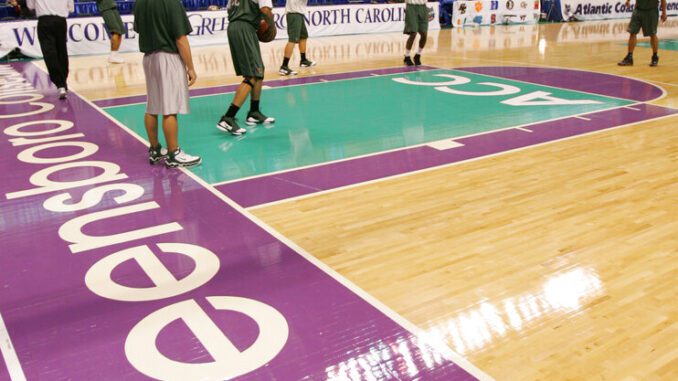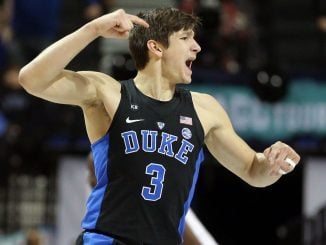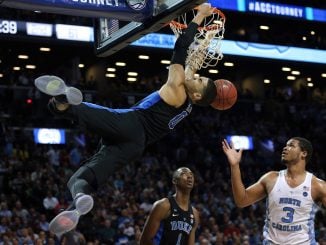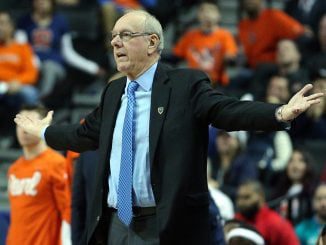
Not that long ago, the ACC Tournament was a matter of life-or-death for players, coaches and  fans. It was a combination of a heavyweight boxing championship, Shakespearean drama, and good old morality plays right out of the Old and New Testament that gripped Tobacco Road basketball fans for 72 straight hours.
fans. It was a combination of a heavyweight boxing championship, Shakespearean drama, and good old morality plays right out of the Old and New Testament that gripped Tobacco Road basketball fans for 72 straight hours.
ACC players, coaches and fans loved it — and hated it at the same time.
“The History of the ACC Tournament” — or “toonament” as Maryland coach Lefty Driesell and many southern gentlemen called it — now airing on the ACC Network helps older fans relive those glory days and younger fans understand what made the ACC great in the first place.
For 20 years from 1954-1974, only the winner of the ACC Tournament, not the regular season, would get invited to the NCAA Tournament. Had last weekend been the ACC Tournament finals under the original setup, heavily-favored and nationally-ranked Duke would have been sent home in a massive upset by the Tar Heels who would be the only ACC team in the NCAA Tournament.
The ACC Tournament back then essentially was the equivalent of the first three rounds of the NCAA Tournament today. Lose and go home just like in the NCAAs. There were only 24 teams in the 1954 NCAA Tournament; it wasn’t until 1975 that it expanded to 32 teams and then to 64 teams in 1985.
The problem was that a second-round ACC Tournament game might pair two Top Ten teams in the nation, not a #1 seed against Wagner College of New York.
Games would start at noon on Thursdays and last until the wee hours of Friday morning if there were overtimes along the way. Wispy gray clouds would descend from the rafters during the games from anxious chain-smokers who were allowed to smoke during games at Reynolds Coliseum in Raleigh.
No wonder it is called “Tobacco Road.”
Everyone knew the tournament was a big deal starting in the first grade. Teachers would halt all classes and roll out A/V carts with TVs to watch just two things: a NASA rocket launch and the ACC Tournament.
It was a modern-day gladiator battle, figuratively speaking. The hopes and dreams of all the fans, coaches and players for their season and career would be prosecuted during each 40-minute game.
Over three days, otherwise normal and sane people would project their views of morality on the players, coaches and fans of the opposition. Our side is always “good”; those guys are always “bad.” Dean Smith would be viewed as a saint with angel wings and halo by Carolina fans; Duke fans saw him as a sanctimonious whiner who chickened out by making his players hold the ball instead of playing the more talented Blue Devils.
There was a unique Shakespearean tragedy aspect to each ACC Tournament. Would Lefty Driesell of Maryland beat his nemesis NC State with David Thompson and win the title? (No, he wouldn’t but he finally won in 1984 with Len Bias.)
Would David take down Goliath? Vann Williford of NC State led the Pack to a gargantuan upset over John Roche and his South Carolina teammates to win the 1970 tournament. The rest of the ACC rejoiced almost as much as State fans since everyone hated USC coach Frank McGuire and his New York City players.
Allowing only one ACC team to advance to the NCAAs was totally “unfair” to the other great teams in the conference on an annual basis. But that restriction is what made the ACC “The Greatest Basketball Conference of America.” It forced great coaches such as Everett Case at NC State; Frank McGuire (UNC/USC); Bones McKinney (Wake Forest); Vic Bubas (Duke); Dean Smith (Carolina); Norm Sloan (NC State) and Driesell to recruit the top talent in the nation to win the ACC Tournament and then the national title.
Sadly, the era of extraordinarily high-quality ACC basketball is on the wane. Younger fans will never physically, emotionally or psychologically experience the thrill of victory or the agony of defeat as did their parents and grandparents watching the original ACC Tournament.
It sure was fun while it lasted.



